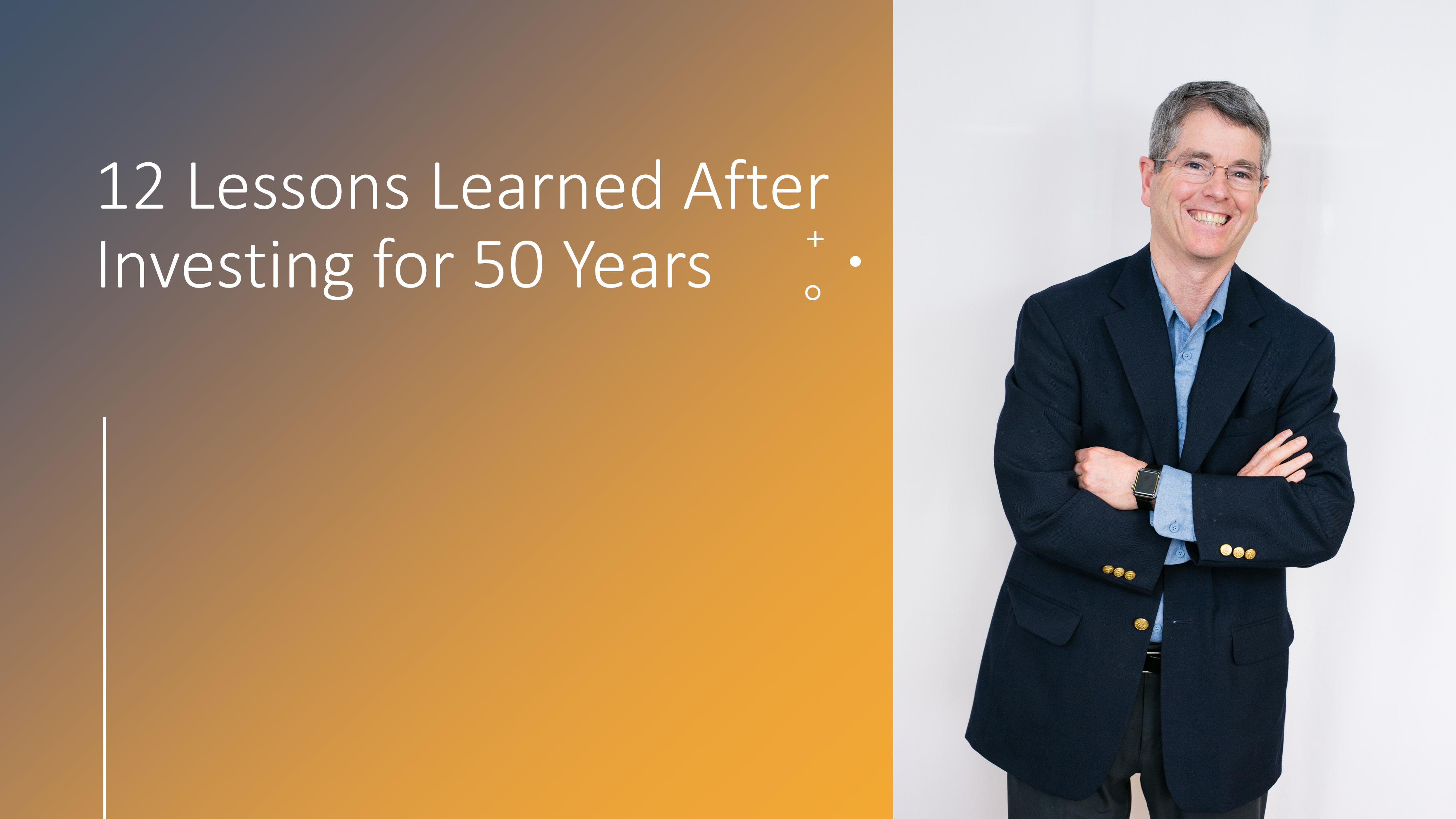I’ve been investing for more than 50 years. My careers spans from personal investing starting at age 10 to becoming the director of a private investment firm for high net worth investors. Here are a few highlights:
- 1969 – Bought my first stock at age 10 with the help of my dad and his stockbroker friend. I loved doing research and learning about stocks and the market.
- 1982 – Took my first finance job in public accounting as an auditor. Though I loved finance, I quickly learned that accounting was not for me.
- 1983 – Started as a portfolio manager and stock analyst of a local bank and earned CFP and CFA designations. This was a much better fit, allowing me to apply the interest sparked at age 10.
- 1989 – Began at Russell Investments as an investment advisor. I loved the culture, grew in my knowledge of financial markets, asset allocation, money manager selection.
- 1995– Transitioned to Russell Private Investments, working with the firm’s high net worth clients, eventually becoming the interim director. I also partially retired to allow time to coach college tennis and invest in the student athletes.
- 2000 – Transitioned to the Russell Family Office, called the Threshold Group, as Chief Investment Officer, working closely with the Russell family and executive director of the Russell Family Foundation to advise on how to make the family’s desired legacy and charitable impact.
- 2009 – Retired from my professional work at Russell, continued to informally help friends and family with financial matters and manage our personal portfolio.
- 2021 – Entered the next phase of my career as Strategic Advisor to the Alterra Advisors team. Like my days at Russell, I love our culture at Alterra, being back in the financial world, learning new things, and helping clients…and working alongside my son is a bonus!
Along the way, I’ve learned a few important lessons to share. From practical to personal and everything in between, I hope you find something to apply here!
- Start early. I bought my first stock at 10 years old. Now, at 62, my initial investment has been growing for more than 50 years. $100 earning 6% per year would be worth $2,070 today. If I had waited until age 21 to start the $100 would be worth $1,090. Don’t beat yourself up for where you are now…but get started!
- Live within your means. Stress management is an often overlooked aspect of financial and investment life. Spending less than you make is one of the most freeing things you can do in the long run. Using a credit card for that purchase you can’t quite afford yet can relieve stress in the short run, but overspending is very stressful in the long run. Short term discipline yields long term relief.
- Invest in others. Few things bring joy like meeting needs of the less fortunate and this joy is a great investment. From the beginning, we set aside at least 10% of our income to give away. We’ve also invested in others, helping close friends and family purchase homes through equity sharing.
- Don’t stay emotionally tied to any investments. Holding losing investments for too long, or winning investments for that matter, can be costly. Make a plan for investments you want to hold and proportions you want to hold them in, include a schedule for how often you’ll rebalance your portfolio, and stick to it. As much as possible, take out the emotion and guess work. This is especially helpful for those of you that work for a company where stock options are a significant part of your income.
- Don’t be a lone ranger. Many of you are married and, though one of you may lead the investment decisions, make decisions, especially large decisions, together. Having to justify why I wanted to invest in something helped keep me from making several stupid decisions over the course of my life. For those who aren’t married, find a trusted friend, colleague, or advisor as a sounding board.
- Assign extra income before it comes in. When we bought our first house, mortgage interest rates were around 12%. When we had extra income, we used some of it for investments and some to pay down our mortgage…both were good options at the time. With lower interest rates, it can make more sense to build long term investments rather than paying down debt. But whatever you do – paying down debt, building your portfolio, or both – decide where you’ll invest that extra income before it hits the bank account. For more, read Should I Pay Off My Mortgage Early?
- Know what you know…and what you don’t. I’ve never been a fan of timing the stock market. Why? Without a crystal ball, it’s a guessing game. It can also be devastating to your long term results. If you were on the sidelines and missed the best 10 days in the market since 1980, you cut your return in half. It’s ok to have some play money to speculate with, but not with your nest egg – the money you need to reach your financial goals. Long-term success comes from a disciplined strategy consistent with your time horizon and risk tolerance – for more, see Investing vs. Speculating and Why it Matters. As an investment professional, I know stocks best, so I’ve sought advice from experts about other ways to build wealth, like real estate, insurance, bonds, and more.
- Recognize the difference between appreciating and depreciating assets. More importantly, don’t treat an expense like an investment. In 1989, we bought a used car for $5,900 and a share of Berkshire Hathaway for $5,900. The car is gone but it helped our family get from place to place and we enjoyed it! Berkshire, on the other hand, is worth over $400,000 and has helped our family reach important financial goals. The car isn’t bad, it’s just not an investment. This can often carry over into questions about home remodeling, new equipment for your business, and many other areas that are sometimes justified as investment but are really a lifestyle upgrade.
- Rebalance your portfolio regularly. Rebalancing isn’t just good housekeeping for your investments, it’s a systematic way to buy low and sell high. This also helps ensure your portfolio doesn’t stray too far from your risk tolerance over time. Consider a portfolio that starts at 75% stocks, 25% bonds. If the stocks double and bonds stay flat, you’re now sitting with 85% in stock, 15% in bonds, which is more aggressive than the strategy you started with. 1987 is a great example. Stocks were up over 40% through the summer, by rebalancing (selling high), some of the gains would have been locked in. Then, after the over 20% decline in the fourth quarter, rebalancing again (buying low) would have put money back into stocks at lower levels.
- Change your portfolio as you change your life. In 1999, I reduced to part time hours with Russell Investments to create space to coach college tennis and spend more time with our young kids. This meant using investment income to meet some expenses. To accommodate this, we changed a portion of our investment strategy from a growth focus to a preservation and income focus. We didn’t need to do this for everything, just the funds we expected to need in the next 5-7 years. Anticipate these changes in your life and prepare your portfolio to support you ahead of time.
- Focus on life-giving activities, delegate life-draining activities. I love investing. I think about stocks all the time…and I enjoy it! But most people don’t enjoy it like I do. If you’re self-managing your investment plan, but find it life-draining, it can lead to neglecting those important reviews and adjustments that keep you on track to reach your goals. Instead, spend your time focused on enjoyable activities within your expertise and find someone to help guide you for the rest.
- Prepare to land the plane. If you’ve spent a life investing wisely, it’s likely you’ll have something to leave to loved ones or causes you care about. Start thinking about your exit strategy now. Who will inherit your wealth? What impact will your legacy make when you have passed on? Thinking, planning, discussing this transition now enables you to pass both wealth and values. What better time to shape the vision for your legacy for the next generation? I’m not sure I’m ready to land the plane, but I’m certainly thinking about it and having those discussions with my family.
Above all, I’ve learned that everyone is different, each with unique goals and dreams. Whether for you, your family, or charities you care about, it’s our privilege to work alongside you to refine your objectives and put strategies in place that help ensure the impact you intend is the impact you make!
The “Alterra” name was coined by joining the Latin roots “alter”, the origin of the word “altruism” with “terra” meaning earth or land. This name reflects the company philosophy of “clients before profits” and providing firmly grounded advice.

